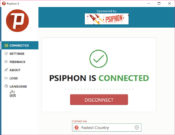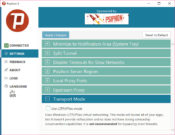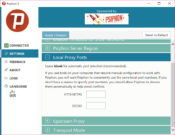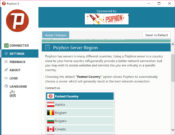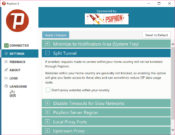- Review
Psiphon is a powerful anti-censorship tool designed to help users bypass restrictions and access a freer internet. Originally developed by the Citizen Lab at the University of Toronto, it has grown into one of the most widely used circumvention tools worldwide, relied upon in countries with heavy censorship such as China, Iran, and Myanmar.
At its core, Psiphon masks your IP address and routes your internet traffic through secure tunnels, letting you visit websites that would normally be blocked.
Unlike many VPN services that focus primarily on privacy, this tool focuses first on access, making sure you can connect where others fail. For journalists, activists, or simply everyday users living under censorship, it has become a lifeline.
Simple setup with flexible options
Once connected, Psiphon automatically selects a secure pathway using VPN, SSH, or SSH+ protocols. This adaptive approach means it can evade different types of censorship barriers.
If you prefer, you can manually select servers from a list, choosing those closest to your country for faster speeds or experimenting with alternatives if one connection fails.
The client also allows adjustments to advanced settings, such as changing the port number or tweaking protocol preferences. For the majority of users, default settings work flawlessly, but advanced users benefit from the flexibility to fine-tune performance.
Multiple protocols for maximum accessibility
One of Psiphon’s strongest qualities is its hybrid technology. It doesn’t just rely on VPN tunneling. If that fails, it can switch to SSH or SSH+ proxying to bypass blocks. This adaptability is crucial in places where governments aggressively block or throttle VPN traffic.
For example, if a government firewall detects and blocks common VPN connections, Psiphon will fall back to SSH+ mode, disguising traffic in a way that makes it look like regular secure web browsing.
This constant adaptability keeps the door open even in environments with the most sophisticated filtering systems.
A tool built for censorship, not full privacy
It’s important to understand the trade-offs. Psiphon hides your traffic from your internet service provider, making it far harder for authorities to see what you’re browsing. However, it is not designed to deliver complete anonymity or the advanced privacy safeguards of premium VPNs.
While it encrypts your connection, some metadata such as IP addresses and connection times may still be logged.
Security experts generally recommend Psiphon for unblocking content and bypassing censorship, not for highly sensitive activities where complete privacy is required.
Performance and everyday use
In real-world usage, Psiphon works best when speed is not the primary concern. Free users are capped at lower speeds, often around 2 Mbps, which is fine for browsing, messaging, or reading blocked news sites but insufficient for high-definition streaming or large downloads. Paid “PsiCash” tokens can temporarily boost performance, but the tool remains slower than premium VPNs by design.
On the other hand, its strength lies in reliability. During internet shutdowns in countries like Cuba and Myanmar, usage numbers skyrocketed, with millions relying on Psiphon to get access when alternatives failed. This resilience is what sets it apart.
Ease of use for everyone
Beginners will appreciate the simplicity. The graphical interface is straightforward, with a prominent connect button and an option to select a server. Advanced menus are available for those who want more control, but they are not required to get started.
For mobile users, the Android and iOS apps offer the same functionality, with added convenience of on-the-go censorship circumvention. Multilingual support also makes it accessible to users worldwide, regardless of technical experience.
Pros
- Bypasses internet censorship effectively using VPN, SSH, and SSH+
- Disguises IP address and hides activity from ISPs
- Very beginner-friendly with a simple, intuitive interface
- Supports manual tweaking for advanced users
- Cross-platform availability with multilingual support
- Relied upon by millions worldwide during internet shutdowns
Cons
- Free version speed is capped and often slow
- Not intended for full anonymity or complete privacy
- Performance may vary depending on network and device
- Lacks advanced VPN features like kill switch or DNS leak protection
FAQs
1. Can Psiphon unblock websites that are restricted in my country?
Yes. It routes your traffic through secure tunnels to hide your IP address and grant access to blocked sites.
2. Does Psiphon make my browsing completely private?
No. It hides activity from your ISP and helps you stay safer, but it is not designed for total anonymity.
3. What protocols does Psiphon use?
It uses a combination of VPN, SSH, and SSH+ protocols, automatically selecting the most effective one for your connection.
4. Can I choose which Psiphon server to connect to?
Yes. You can either let the program choose the best one or manually select from the server list.
5. Is Psiphon suitable for streaming or downloading large files?
Not really. Free users will find speeds too slow for streaming or big downloads, although paid tokens can improve performance temporarily.
Conclusion
Psiphon is not a typical VPN. It is a dedicated anti-censorship tool designed to restore open internet access where it’s restricted. Its greatest strength is reliability in hostile environments, where it can succeed when other tools are blocked. With millions of users worldwide, it has proven itself as a trusted ally for those who need access above all else.
While its slower speeds and limited privacy features mean it’s not ideal for streaming or sensitive work, its ease of use, resilience, and hybrid tunneling technology make it one of the most effective censorship-circumvention tools available today.


 (472 votes, average: 4.14 out of 5)
(472 votes, average: 4.14 out of 5)